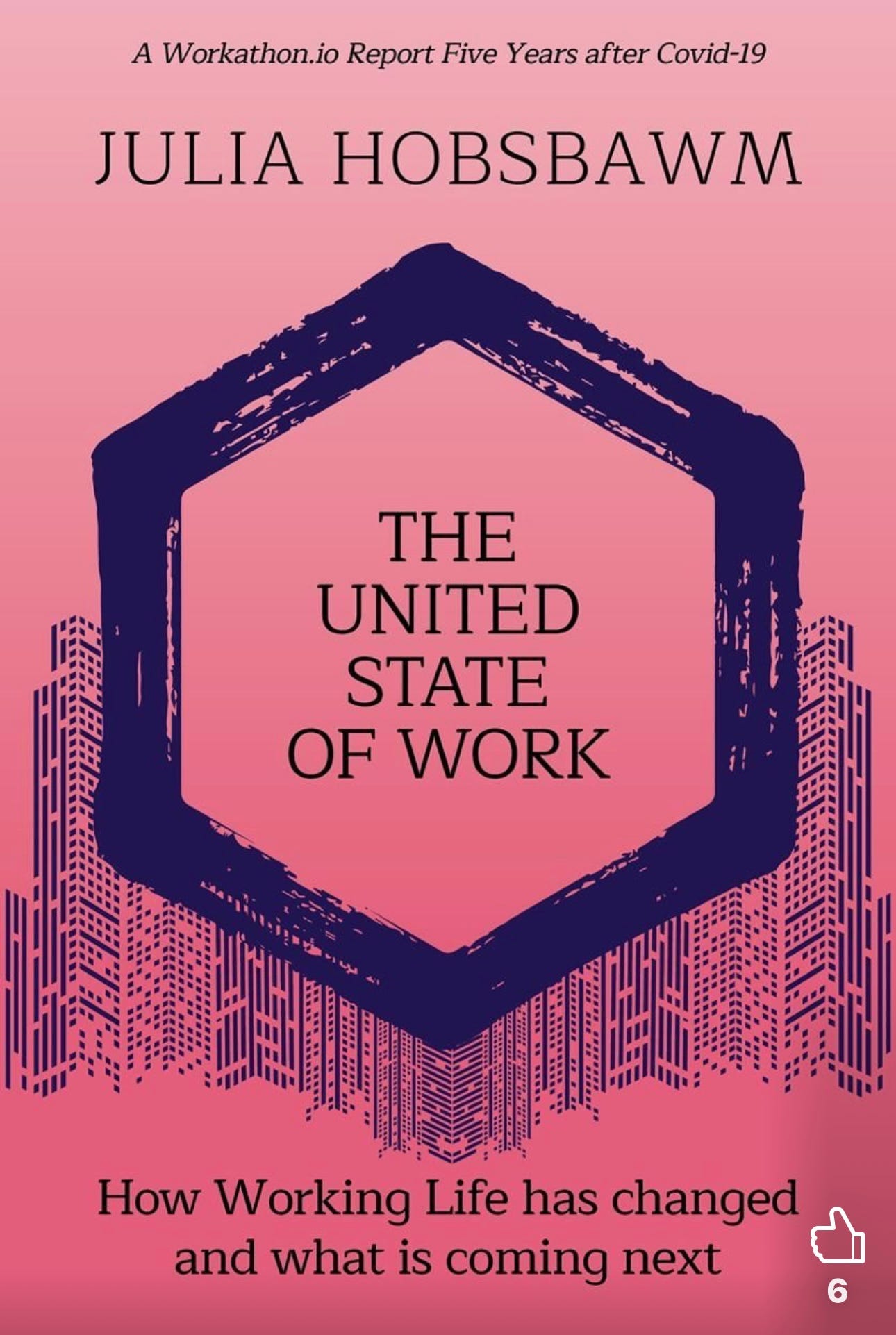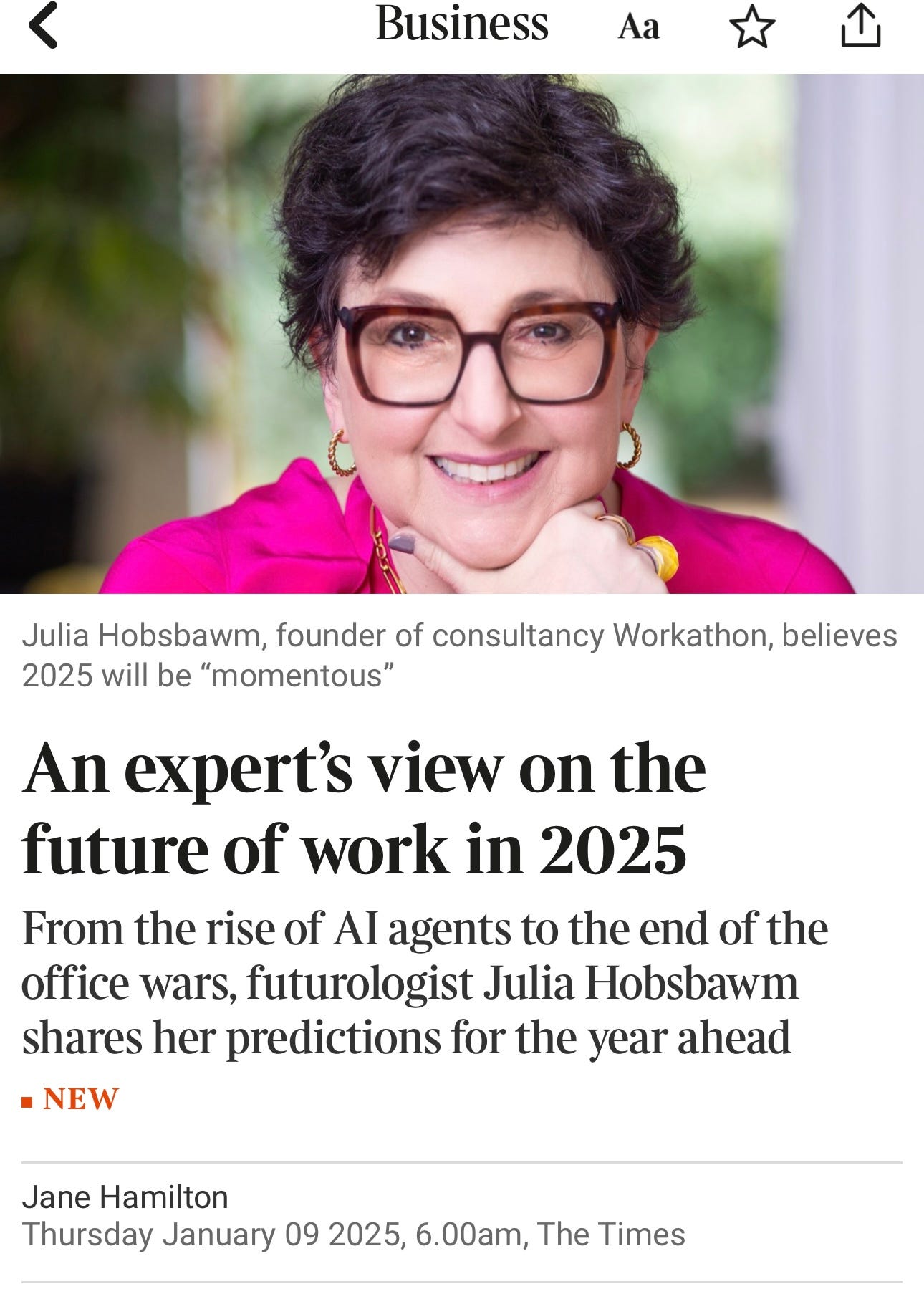January 20th 2025
Hallo. It’s a huge day today in the world of politics and policies which affect not just life but work: It is the day Donald Trump returns to the White House and it's the day The World Economic Forum starts in Davos, Switzerland.
I declined my invitations this year to wonderful meetings and parties, not because I hate snow (which I do: so sue me!) but because i’m putting the finishing touches to a report which www.workathon.io is publishing in March.
THE GRANDIOSE and the GRANULAR
How the world fares in work is both a granular and a grandiose question: at a granular level individual countries have their own specific issues - from the UK’s parlous problem with “economic inactivity” in its workforce and controversial changes to employer tax causing rows about jobs to Jordan being a little-known champion of flexible work and Indonesia being amongst countries taking advantage of the new tourism boom in Digital Nomad visas.
And at a grandiose level the impact of everything from climate, ageing populations, falling fertility, AI and geopolitics all pertain to how we work, uniting us all in challenge and opportunity.
THE UNITED STATE OF WORK will provide a snapshot of this picture in the crucial period 2020-2025. It will combine data, research and analysis of some trends around the world since that month five years ago - March - when the world of work stopped working as we new it and restarted overnight in a new way.
For instance, some of our research will show the impact the geopolitical conflict of Israel/Gaza has had on workplace culture (and politics).
Our report is published by my new venture WORKATHON https://www.workathon.io/ which is both an invitation-only network for senior decision-makers in organisations playing a key role in addressing the future of work and a new think-tank.
WORKATHON’s data and research unites and synthesises the latest trends, data and analysis globally on work and gives voice to key players in a way which is actually new to the market.
PLACES & SPACES OF WORK
In this report we’re looking at the past, present and future of work. This data is from JLL, the distinguished global real estate, property management and consultancy firm which I am pleased to say is Foundational Partner of WORKATHON. Their recent research cited in Forbes https://www.forbes.com/sites/emilsayegh/2024/09/25/data-centers-at-the-heart-of-the-ai-and-digital-economy-surge/# shows for instance that the market in data centers has doubled since 2020 to reflect the demand for digital infrastructure and artificial intelligence.
The above chart is from JLL’s piece for our report and shows the projected changes to workplaces by 2030 which factor in the impact of the way we can be so much more mobile now than ever before.
Not remotely (no pun intended) the end of the office but…
COMPLEX TAPESTRY
Peter Miscovich, JLL’s Global Future of Work Leader and Executive Managing Director has written a fascinating piece for the report together with his research colleague from JLL’s Paris team, Flore Padere on what they aptly call “the complex tapestry” globally on the transformation of work 2020-2025 and explains the scale of shifts and the surprising trends which are really emerging.
THE UNITED STATE OF WORKATHON
In addition our report also features contributions from a smart set of key individuals associated with Workathon on the research and consultancy side including future of work expert Brian Elliott; Turkey’s pioneering wellbeing digital entrepreneur Melis Abacıoğlu; and members of our US Advisory Board, including two pictured here with me in New York recently: the brilliant workplace experience and change specialist Phil Kirschner and distinguished social anthropologist Melissa Fisher.
REMOTE RESEARCH
Hard at work number crunching for The United State of Work report is William Corke, Workathon’s Head of Client Services and Research, pictured at London’s lovely Delaunay Restaurant recently when we scoped out the full picture of what we want in our global snapshot - including some data we will announce shortly and including a survey we designed for our network of white collar professionals, the results of which will be also included. There is just time still to take it here:
https://forms.office.com/pages/responsepage.aspx?id=sqYF-Xvt5Uy_9T5Ps77Zz3bzMxAKmMdCvV1oAUaYq9BUMUw2RURLVkUzVlFNWVMwWlFGR1JUMzVOMy4u&route=shorturl
2025’s CRYSTAL BALL
I was asked by The Times to provide some thoughts on the major trends for 2025 and work and I summarised them in Linked In:
1) THE CHIEF AI OFFICER cometh.
2) AI AGENTS have entered the building.
3) DATA is KING (move over, content)
4) OFFICES AS VILLAGE- think hospitality and hotels-meets-private clubs and houses.
5) RTO is OVER -it's just not the big story now
6) FAIRNESS FOR DIVERSITY - the DEI agenda may shift away from some of its early incarnations but fundamentals do and should and will remain.
This got some pretty good discussion going. What do you think? Please email me: julia@thefullyconnected.com
THE AIs HAVE IT
And Finally….
Certainly much talk at Davos is on AI: arguably last year it was Green Jobs. Linked In have just published https://economicgraph.linkedin.com/research/work-change-report to highlight the significance of AI at work too. Well worth a read.
Sidebar: i’m fascjnated by the tiny ways tech does not work well. For example: this post is being typed on an iPhone. For unfathomable reasons you can’t create a hyperlink on an iPhone on Substack.
I think I might create a regular spot for tech glitches we know and love (said with love).
So that’s it. Seismic change and work impacted by all of it and arguably at the centre of it.









